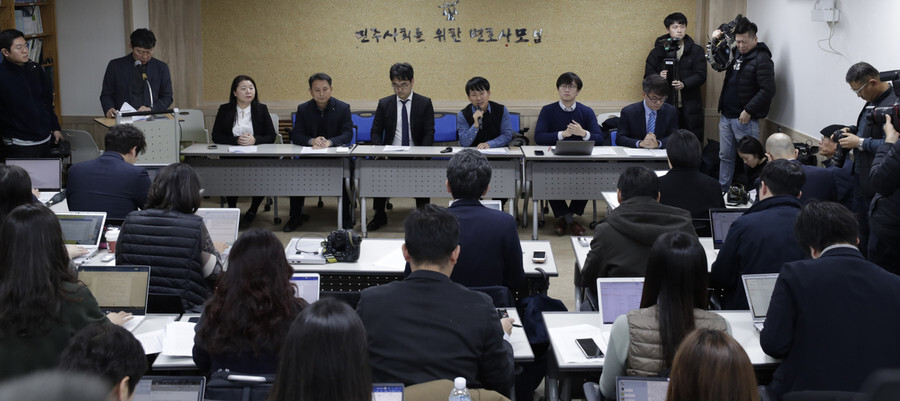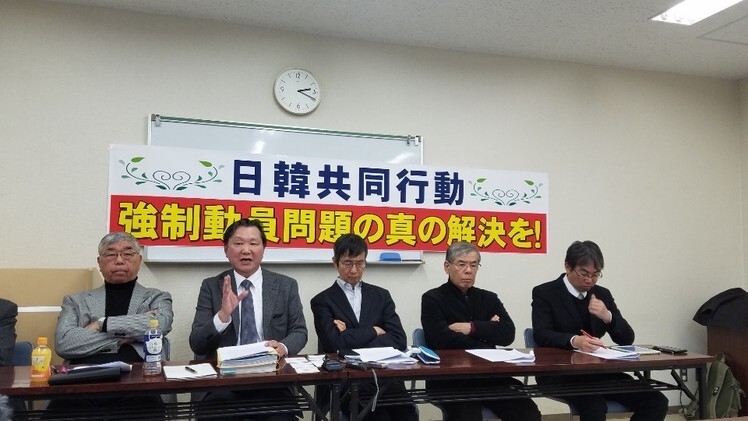hankyoreh
Links to other country sites 다른 나라 사이트 링크
Forced labor victims propose forming S. Korea-Japan consultative body to solve historical dispute

Groups representing the victims of forced labor during Japan’s colonial occupation of Korea have proposed that Seoul and Tokyo set up a joint consultative body to resolve the issue of compulsory mobilization, one of the biggest disputes between the two countries. This is the first time the victims have proposed a solution since South Korea’s Supreme Court ordered Japanese companies to pay them compensation in October 2018. Since the South Korean government has promised to find a victim-centered solution to the issue, the victims’ proposal is likely to affect the two countries’ negotiations.
The legal teams for the victims of forced labor who have already won their case at the Supreme Court or who are pursuing separate lawsuits, the groups supporting the victims, and Japanese attorneys held separate press conferences in Tokyo and Seoul on Jan. 6 during which they proposed setting up a consultative body to review ways to find a complete solution to the issue. The governments of South Korea and Japan need to support this consultative body, the groups said, and respect the outcome of its deliberations. If some sort of solution is reached through the consultative body, the groups added, they could look into the possibility of asking the victims about halting efforts currently underway to liquidate the South Korean assets of Japanese companies.

Starting point for resolution is for Japanese government and companies to acknowledge the fact and to apologize
The legal team for those drafted for labor at companies such as Nippon Steel and Mitsubishi Heavy Industries and groups supporting those victims held a press conference at the large conference room at the office of MINBYUN-Lawyers for a Democratic Society, in Seoul’s Seocho District. “A year and two months have passed since the Supreme Court’s ruling in this case, but the issue remains unresolved. Since last year, we’ve been discussing potential solutions in both South Korea and Japan, and we’re presenting [the results of that discussion] simultaneously now, in both countries,” the groups said.
These groups clearly stated that the starting point for resolving this issue is for the Japanese government and companies to acknowledge the fact of forced labor and to apologize for it. “The South Korean government also needs to take full responsibility, and the South Korean companies that benefited from the claims agreement with Japan in 1965 should be part of the solution, too,” the groups said. For such reasons, the groups said, the consultative body should include legal representatives of the victims and members of the supporting groups, as well as attorneys, scholars, businesspeople, and politicians from both countries.
“Whereas all proposed solutions so far, including those suggested by the Ministry of Foreign Affairs and Moon Hee-sang, have been made by South Korea, this proposal is important because it was created through the collaboration of civic groups and legal teams from both South Korea and Japan,” said Im Jae-seong, an attorney from Haemaru Law Firm who is representing forced labor victims.
“Several proposals have been made, including the proposal by [South Korean National Assembly] Speaker Moon Hee-sang, but all of them have been focused on who has to pay. But the important thing is the issue of human rights for the individual victims,” said Shiro Kawakami, an attorney, while reading a statement at the press conference held in Tokyo at the same time on Monday. Kawakami went on to say that establishing a consultative body is needed if a genuine solution is to be found. Other figures at the press conference were Seita Yamamoto, an attorney who represented former comfort women for the Japanese army in a 1992 lawsuit in Japan, and Terumi Terao, co-president of a group in Nagoya supporting lawsuits by Korean women forced to work for Mitsubishi.
Liquidation proceedings of assets needs to be halted, which would lead to economic retribution from JapanOne reason that the victims of forced labor are actively calling for the creation of a consultative body is because of the potential ramifications of liquidating the Japanese assets. Both South Korea and Japan are concerned about the possibility that the assets seized from Japanese companies following the Supreme Court’s decision might actually be sold off. Since May 2019, the Pohang Branch Court of the Daegu District Court has been preparing to order the sale of assets belonging to Nippon Steel. Since the Japanese government has blatantly threatened retribution if the assets are liquidated, the two countries’ relationship would take another beating, with the historical dispute leading to economic retaliation.
“Liquidating the assets would create a difficult situation for both the South Korean and Japanese governments and their respective publics. We can’t just sit back and let that happen,” said Lee Sang-gap, an attorney with the law firm Gonggam who is on the legal team for forced labor victims.
Im, the attorney, agreed. “We need the individual consent of the victims who are involved in these proceedings to halt the liquidation. I don’t think we’ll be able to put the question to the victims until a potential solution to the forced labor issue is reached by a consultative body.”
By Kim So-youn, staff reporter, and Cho Ki-weon, Tokyo correspondent

Editorial・opinion
![[Column] Season 2 of special prosecutor probe may be coming to Korea soon [Column] Season 2 of special prosecutor probe may be coming to Korea soon](https://flexible.img.hani.co.kr/flexible/normal/500/300/imgdb/original/2024/0426/3317141030699447.jpg) [Column] Season 2 of special prosecutor probe may be coming to Korea soon
[Column] Season 2 of special prosecutor probe may be coming to Korea soon![[Column] Park Geun-hye déjà vu in Yoon Suk-yeol [Column] Park Geun-hye déjà vu in Yoon Suk-yeol](https://flexible.img.hani.co.kr/flexible/normal/500/300/imgdb/original/2024/0424/651713945113788.jpg) [Column] Park Geun-hye déjà vu in Yoon Suk-yeol
[Column] Park Geun-hye déjà vu in Yoon Suk-yeol- [Editorial] New weight of N. Korea’s nuclear threats makes dialogue all the more urgent
- [Guest essay] The real reason Korea’s new right wants to dub Rhee a founding father
- [Column] ‘Choson’: Is it time we start referring to N. Korea in its own terms?
- [Editorial] Japan’s rewriting of history with Korea has gone too far
- [Column] The president’s questionable capacity for dialogue
- [Column] Are chaebol firms just pizza pies for families to divvy up as they please?
- [Column] Has Korea, too, crossed the Rubicon on China?
- [Correspondent’s column] In Japan’s alliance with US, echoes of its past alliances with UK
Most viewed articles
- 1AI is catching up with humans at a ‘shocking’ rate
- 2‘We must say no’: Seoul defense chief on Korean, USFK involvement in hypothetical Taiwan crisis
- 3[Column] Season 2 of special prosecutor probe may be coming to Korea soon
- 4Is Japan about to snatch control of Line messenger from Korea’s Naver?
- 5Up-and-coming Indonesian group StarBe spills what it learned during K-pop training in Seoul
- 6The dream K-drama boyfriend stealing hearts and screens in Japan
- 7Is N. Korea threatening to test nukes in response to possible new US-led sanctions body?
- 8S. Korea “monitoring developments” after report of secret Chinese police station in Seoul
- 9Ferry accident likely due to whale; 1 killed
- 10[Column] ‘Choson’: Is it time we start referring to N. Korea in its own terms?